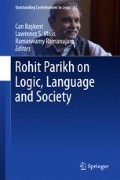Abstract
In my joint paper (Parikh and Väänänen in Ann Pure Appl Log 134(1):83–93, 2005) with Rohit Parikh we investigate a logic arising from finite information. Here we consider another kind of limited information, namely information with a small number of errors, and prove a related completeness theorem. We point out that this approach naturally leads to considering multi-teams in the team semantics that lies behind (Parikh and Väänänen 2005).
This paper was written while the author was visiting the Computer Science Department of the University of California, Santa Cruz. The author is grateful to his host Phokion Kolaitis for the invitation and for the hospitality. The author is grateful for helpful discussions on this topic with P. Galliani, L. Hella, and P. Kolaitis. The author also thanks J. Kivinen, Jixue Liu, H. Toivonen and M. Warmuth for helpful suggestions. Research partially supported by Grant 40734 of the Academy of Finland.
Access this chapter
Tax calculation will be finalised at checkout
Purchases are for personal use only
Notes
- 1.
An essentially same, as well as related approximate functional dependences, were introduced already in Kivinen and Mannila (1995).
- 2.
We can use this example to encode the Halting Problem to the question whether a recursive set of approximate dependence atoms logically implies a given approximate dependence atom.
- 3.
Proposition A.3 of Kivinen and Mannila (1995) is a kind of completeness theorem in the spirit of the below theorem for one-step derivations involving approximate dependence atoms.
References
Armstrong, W. W. (1974). Dependency structures of database relationships. IFIP Congress 1974, 580–583.
Bělohlávek, R., & Vychodil, V. (2006). Data tables with similarity relations: Functional dependencies, complete rules and non-redundant bases. In M. Lee, K.-L. Tan, & V. Wuwongse (Eds.), Database systems for advanced applications (Vol. 3882, pp. 644–658)., of Lecture Notes in Computer Science Berlin: Springer.
Kivinen, J., & Mannila, H. (1995). Approximate inference of functional dependencies from relations. Theoretical Computer Science, 149(1), 129–149. Fourth International Conference on Database Theory (ICDT ’92).
Parikh, R., & Väänänen, J. (2005). Finite information logic. Annals of Pure and Applied Logic, 134(1), 83–93.
Väänänen, J. (2007). Dependence logic, volume of London Mathematical Society Student Texts. Cambridge: Cambridge University Press.
Author information
Authors and Affiliations
Corresponding author
Editor information
Editors and Affiliations
Rights and permissions
Copyright information
© 2017 Springer International Publishing AG
About this chapter
Cite this chapter
Väänänen, J. (2017). The Logic of Approximate Dependence. In: Başkent, C., Moss, L., Ramanujam, R. (eds) Rohit Parikh on Logic, Language and Society. Outstanding Contributions to Logic, vol 11. Springer, Cham. https://doi.org/10.1007/978-3-319-47843-2_12
Download citation
DOI: https://doi.org/10.1007/978-3-319-47843-2_12
Published:
Publisher Name: Springer, Cham
Print ISBN: 978-3-319-47842-5
Online ISBN: 978-3-319-47843-2
eBook Packages: Religion and PhilosophyPhilosophy and Religion (R0)

